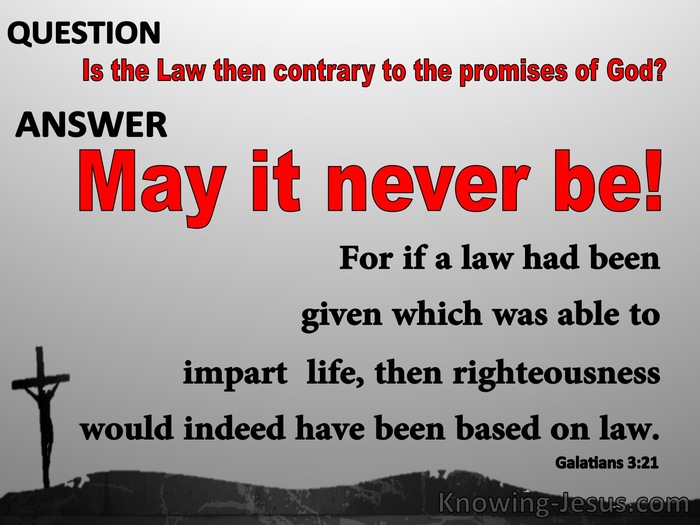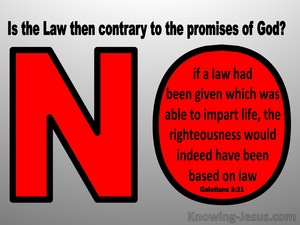Parallel Verses
Williams New Testament
Is the law then contrary to God's promises? Of course not. For if a law had been given that was able to impart life, surely, then, right standing would have come through law.
New American Standard Bible
Is the Law then contrary to the promises of God?
King James Version
Is the law then against the promises of God? God forbid: for if there had been a law given which could have given life, verily righteousness should have been by the law.
Holman Bible
Is the law therefore contrary to God’s promises? Absolutely not! For if a law had been given that was able to give life, then righteousness would certainly be by the law.
International Standard Version
So is the Law in conflict with the promises of God? Of course not! For if a law had been given that could give us life, then certainly righteousness would come through the Law.
A Conservative Version
Is the law therefore against the promises of God? May it not happen! For if a law was given that could make alive, truly righteousness would be from law.
American Standard Version
Is the law then against the promises of God? God forbid: for if there had been a law given which could make alive, verily righteousness would have been of the law.
Amplified
Is the Law then contrary to the promises of God? Certainly not! For if a system of law had been given which could impart life, then righteousness (right standing with God) would actually have been based on law.
An Understandable Version
Is the law of Moses contrary to the promises of God? Certainly not! For if there had been a law given which could provide [never ending] life, then a person could be considered right with God by [obeying the requirements of such] a law.
Anderson New Testament
Is the law, then, against the promises of God? It can not be. For if a law had been given which could have given life, surely righteousness would have been by law.
Bible in Basic English
Is the law then against the words of God? in no way; because if there had been a law which was able to give life, truly righteousness would have been by the law.
Common New Testament
Is the law then opposed to the promises of God? Certainly not! For if a law had been given which could impart life, then righteousness would indeed have come by the law.
Daniel Mace New Testament
Is the law then opposite to the promises? by no means. for if there had been a law given, which could have given life, certainly justification should have been by the law.
Darby Translation
Is then the law against the promises of God? Far be the thought. For if a law had been given able to quicken, then indeed righteousness were on the principle of law;
Godbey New Testament
Then was the law against the promises of God? it could not be so. For if the law was given being able to create life, truly justification would have been by law:
Goodspeed New Testament
Is the Law then contrary to God's promises? By no means. For if a law had been given that could have brought life, uprightness would really have come through law.
John Wesley New Testament
Is then the law against the promises of God? God forbid. But if there had been a law given which could have given life, verily righteousness would have been by the law.
Julia Smith Translation
The law then against the promises of God? It may not be: for if a law had been given able to make alive, truly justice would be by the law.
King James 2000
Is the law then against the promises of God? God forbid: for if there had been a law given which could have given life, verily righteousness should have been by the law.
Lexham Expanded Bible
Therefore [is] the law opposed to the promises of God? May it never be! For if a law had been given that was able to give life, certainly righteousness would have been from the law.
Modern King James verseion
Is the Law then against the promises of God? Let it not be said! For if a law had been given which could have given life, indeed righteousness would have been out of Law.
Modern Spelling Tyndale-Coverdale
Is the law, then, against the promise of God? God forbid. Howbeit, if there had been a law given which could have given life: then no doubt righteousness should have come by the law.
Moffatt New Testament
Then the Law is contrary to God's Promises? Never! Had there been any law which had the power of producing life, righteousness would really have been due to law,
Montgomery New Testament
Is the Law then opposed to the promises of God? Certainly not; for if a law had been given which could make alive, then righteousness would actually have come from law;
NET Bible
Is the law therefore opposed to the promises of God? Absolutely not! For if a law had been given that was able to give life, then righteousness would certainly have come by the law.
New Heart English Bible
Is the law then against the promises of God? Certainly not. For if there had been a law given which could make alive, most certainly righteousness would have been of the law.
Noyes New Testament
Is then the Law against the promises of God? Far be it! For if a law had been given which was able to give life, righteousness would indeed have been by the Law;
Sawyer New Testament
Is the law then against the promises of God? By no means. For if a law had been given, able to give life, righteousness would really have been by the law;
The Emphasized Bible
Is, the law, then, against the promises of God? Far be it! For, if a law had been given, which had been able to give life, verily, in law, would have been our righteousness;
Thomas Haweis New Testament
Is the law then contrary to the promises of God? God forbid. For if there had been a law given which was capable of procuring life, verily righteousness would have been by the law.
Twentieth Century New Testament
Does that set the Law in opposition to God's promises? Heaven forbid! For, if a Law had been given capable of bestowing Life, then righteousness would have actually owed its existence to Law.
Webster
Is the law then against the promises of God? By no means: for if there had been a law given which could give life, verily righteousness would have been by the law.
Weymouth New Testament
God, however, is only one. Is the Law then opposed to the promises of God? No, indeed; for if a Law had been given which could have conferred Life, righteousness would certainly have come by the Law.
World English Bible
Is the law then against the promises of God? Certainly not! For if there had been a law given which could make alive, most certainly righteousness would have been of the law.
Worrell New Testament
Is the law, then, against the promises of God? It could not be! For, if a law had been given, which was able to make alive, truly righteousness would have been by law;
Worsley New Testament
Is the law then contrary to the promises of God? not at all: for if a law had been given, which could have confered life, certainly righteousness would have been by the law.
Youngs Literal Translation
the law, then, is against the promises of God? -- let it not be! for if a law was given that was able to make alive, truly by law there would have been the righteousness,
Themes
the Law of moses » Could not give righteousness and life
Topics
Interlinear
Word Count of 37 Translations in Galatians 3:21
Prayers for Galatians 3:21
Verse Info
Context Readings
The Addition Of The Law
20 Though an intermediary implies more than one party, yet God is only one. 21 Is the law then contrary to God's promises? Of course not. For if a law had been given that was able to impart life, surely, then, right standing would have come through law. 22 But the Scripture pictures all mankind as prisoners of sin, so that the promised blessing through faith in Christ might be given to those who have faith.
Phrases
Cross References
Galatians 2:21
I never can nullify the unmerited favor of God. For if right standing with God could come through law, then Christ died for nothing.
Galatians 2:17
Now if, in our efforts to come into right standing with God through union with Christ, we have proved ourselves to be sinners like the heathen themselves, does that make Christ a party to our sin? Of course not.
Matthew 5:17-20
"Do not suppose that I have come to set aside the law or the prophets.
Romans 3:4
Not at all. Let God prove true, though every man be false! As the Scripture says, "That you may prove yourself upright in words you speak, and win your case when you go into court."
Romans 3:6
Not at all! If that were so, how could He judge the world?
Romans 3:20-22
Because no human creature can be brought into right standing with God by observing the law. For all the law can do is to make men conscious of sin.
Romans 3:31
Do we then through faith make null and void the law? Not at all; instead, we confirm it.
Romans 7:7-13
What are we then to conclude? Is the law sin? Of course not! Yet, if it had not been for the law, I should not have learned what sin was, for I should not have known what an evil desire was, if the law had not said, "You must not have an evil desire."
Romans 9:31
while Israel, though ever in pursuit of a law that would bring right standing, did not attain to it.
Romans 10:3-6
For they were ignorant of God's way of right standing and were trying to set up one of their own, and so would not surrender to God's way of right standing.
Galatians 2:19
For through the law I myself have become dead to the law, so that I may live for God.
Philippians 3:6-9
by the standard set by zeal, I was a persecutor of the church, and measured by the uprightness reached by keeping the law, I was faultless.
Hebrews 11:7
By faith Noah, on being divinely warned about things not seen as yet, in reverence prepared an ark for saving his family, and by his faith condemned the world and became possessor of the uprightness that results from faith.






